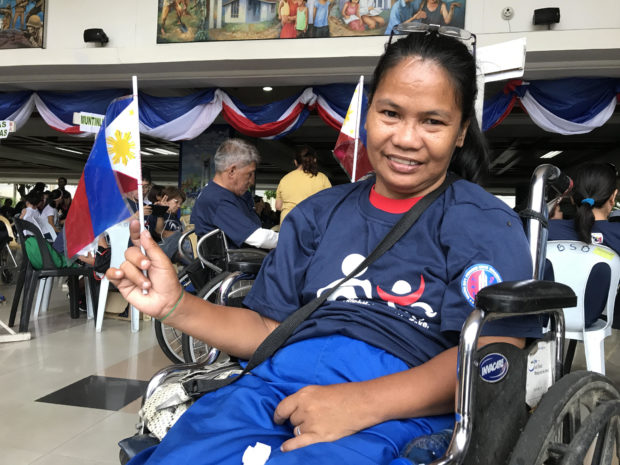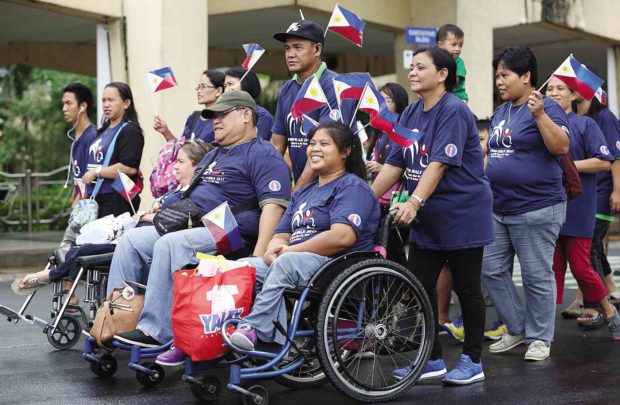PWDs mark challenges, gains in Freedom Walk

Anna Amezola is a Filipino parathlete who joined Saturday’s Freedom Walk of PWDs in Quezon City. She is part of the country’s delegation in the 2017 Asean Para Games to be held in Malaysia in September.-Jhesset O. Enano
Rising early and braving the rains on Saturday morning, Anna Amezola was all smiles as she wheeled herself out of her Quezon City home, with a Philippine flag in each hand and a third planted in her ponytail.
Born with cerebral palsy, the 47-year-old Barangay Bagong Silangan resident was one of more than a thousand persons with disabilities (PWDs) who turned up for their annual Freedom Walk, an event timed with the upcoming Independence Day to spread awareness of the challenges faced and gains steadily won by Filipino PWDs.
Amezola’s participation in the 7-year-old activity marked her transformation from being a shy, wheelchair-bound girl to a forward-looking achiever: She is one of athletes who will be representing the country in the 2017 Asean Para Games in September.
“When I was younger, I just stayed at home and avoided people,” she told the Inquirer. “But then someone told me to accept my disability and encouraged me to live my life.”
“I need to win this for the Philippines,” she said of her upcoming match in boccia, a ball game specifically created for athletes with cerebral palsy and severe locomotor disabilities such as muscular dystrophy and Lou Gehrig’s disease.
Article continues after this advertisementRepresentatives from different cities in Metro Manila and several PWD groups used Saturday’s event to celebrate the successes of the sector. This year’s host, Quezon City, was also the site of the first Freedom Walk in 2011 and where at least 51,000 residents are considered PWDs.
Article continues after this advertisementAccording to the 2010 census of the Philippine Statistics Authority, PWDs account for around 1.4 million or around 1.57 percent of the national population.

More than a thousand PWDs join Saturday’s event in Quezon City.—NIÑO JESUS ORBETA
The country was one of the first in Asia to have its own law on PWD rights, with the passage of the Magna Carta for Persons with Disabilities in March 1992.
Carmen Zubiaga, director of the National Council for Disability Affairs, noted that more and more local governments had been paying attention to the needs of PWDs. Quezon City, for example, opened a PWD affairs office in 2012.
“In the local government units that previously hosted the Freedom Walk (such as Taguig, San Juan and Mandaluyong), they have given more services to PWDs and provided more accessible environments,” she said. “Now, more and more PWDs are working and studying.”
Emer Rojas, president of New Vois Association of the Philippines, said there’s a reason why Freedom Walk is held just before the country’s Independence Day.
“We seek freedom from the barriers (that keep us from being) productive members of society,” said Rojas, who had lost his voice box to laryngeal cancer and needs an electronic device pressed against his throat to make himself audible. “We want to show that we are not hindering the country from growth; instead, we want to contribute to that progress.”